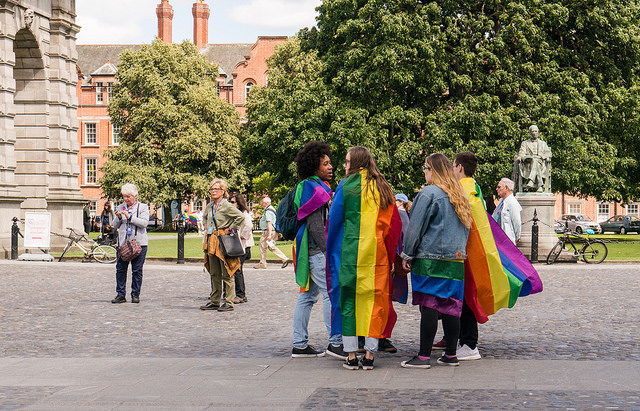Transgender people have existed throughout history, and recent advancements in human gender expression have made space for people who are neither male nor female.
The general term for this is non binary – that is, not part of the binary gender division. Non binary is an umbrella term that covers all people who are not exclusively male or female, whether because they identify as both male and female, because their gender identity is fluid or because they feel no internal sense of gender at all.
In March 2015, Trinity formally launched its Gender Identity and Gender Expression Policy. In its own words, the policy “outlines the College’s formal commitment to recognise and support an individual’s gender identity and gender expression, so that all members of the College community experience a positive and inclusive environment, where every member is treated with dignity and respect”.
The policy defines gender identity as “a person’s deeply felt identification as male, female, or some other gender” and includes, “gender non-binary: The term used to describe any gender identity which does not fit within the traditional binary of male and female”.
Trinity has had over six years to implement its own policy and has failed to do so. When anyone in the university looks at my student record, or that of any other non-binary student, they are given an incorrect gender designation. Through no fault of their own, administrative staff forward emails to me concerning my work or my funding in which I am misgendered.
Trinity has had over six years to implement its own policy and has failed to do so.
More recently, College committed to providing a non-gendered option on official correspondence. Two years later, this has not been implemented across all areas of student life.
AR’s gender designation connects to Blackboard as well, defaulting to only “MR” or “MS” to students. I thus inadvertently misgendered myself to my tutorial students with a broadcast message before our first day.
I am an agender parent in my mid 30s – not most people’s idea of a non-binary person. I’m writing less for myself as I finish my time here, and more for current and incoming students who may not have the confidence, experience or diligence to push for an honest representation of their gender identity whilst at university. My birth certificate, issued outside of Ireland, has the sex designation of “undesignated/non binary”. When I first registered at Trinity, I had to use an incorrect gender designation but did not pursue the issue immediately, sure it would be a simple fix later.
In 2019, I logged an enquiry to Academic Registry to update my gender designation to that on my birth certificate. Six weeks later, I received the following message: “Our Business Support and Planning team who look after upgrading our systems with IT have advised that our IT systems do not currently support the allocation of ‘non binary’ as a gender. They are currently planning the implementation of same and will hopefully be in a position to set an expectation as to when this will be complete shortly.”
Eighteen months later, nothing has changed.
AR’s gender designation connects to Blackboard as well, defaulting to only “MR” or “MS” to students. I thus inadvertently misgendered myself to my tutorial students with a broadcast message before our first day
It’s long overdue for Trinity to step forward and offer intra-university validation for its non-binary students and staff with simple language changes. The most common is the use of singular they/them to refer to one person whose gender is unknown – already present in the English language in such phrases as “someone forgot their mobile”. Non-binary people may also prefer neo pronouns. Asking, or better yet, offering pronouns affirms that every person has the right to experience their gender identity. Forms that ask for gender can have a selection for “non binary” or even “other”. Lecturers can address their students as “students” or “scholars” rather than “ladies and gentlemen”. These small modifications accommodate non-binary people as people.
By eliminating a student’s ability to register as something other than male or female, Trinity has silenced non-binary and gender-questioning members of its own community. There are far more students, faculty, and staff than me who have walked through Front Square without a binary gender, but no one has been allowed to mark it on their own university record.
As Trinity cannot accommodate the very reasonable expectations set out in its own policy, it must be honest to current and incoming students and employees. It is not a “positive and inclusive environment” for us, and we are not “treated with dignity and respect”.
Trinity claims a progressive gender identification policy but it is maintaining a system that leads to the misgendering and invalidation of its non-binary students and members.
Annie C. Humphrey is a PhD candidate in the School of Histories and Humanities, researching the depiction of Vikings in Middle Irish dynastic propaganda texts.







